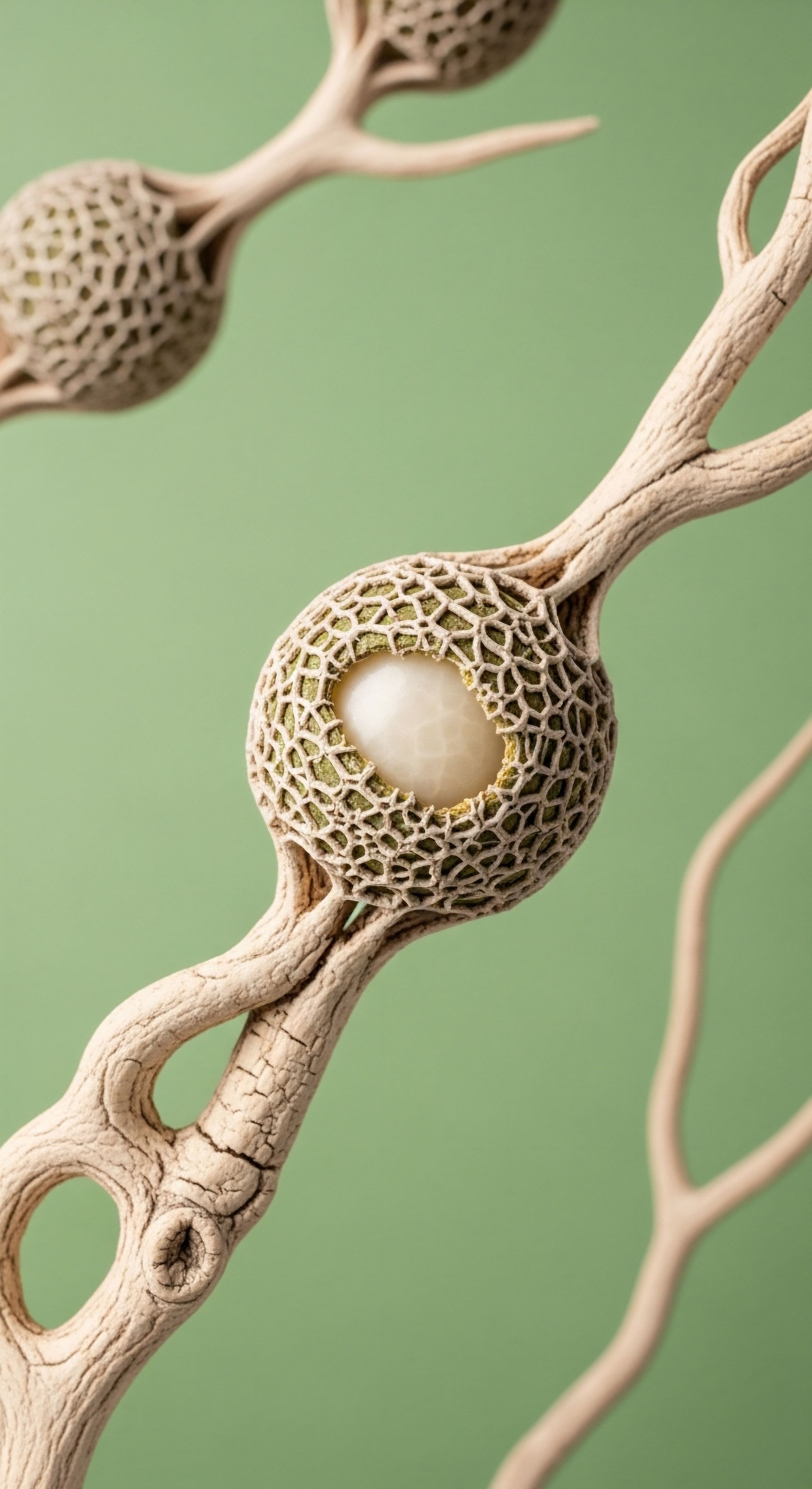

Fundamentals
Many individuals navigating the midlife transition describe a sense of disquiet, a subtle yet persistent shift in their internal landscape. Perhaps you have noticed a change in your ability to focus, a sudden wave of unease, or a sleep pattern that feels entirely foreign.
These experiences are not simply ‘part of aging’; they represent a profound dialogue occurring within your biological systems, particularly as hormonal shifts begin to recalibrate the intricate communication networks of the brain. Understanding these shifts is the first step toward reclaiming your sense of vitality and cognitive clarity.
The brain, a remarkable organ, relies on a delicate balance of chemical messengers to govern mood, memory, sleep, and overall cognitive function. Hormones, often considered regulators of reproductive cycles, are in fact powerful modulators of these very brain chemicals. During the transition into menopause, the primary ovarian hormones ∞ estrogen and progesterone ∞ undergo significant fluctuations and eventual decline. These changes do not occur in isolation; they send ripples through the entire neuroendocrine system, impacting how your brain operates.
Hormonal shifts during menopause profoundly influence brain chemistry, affecting mood, memory, and cognitive function.

The Brain’s Hormonal Receptors
The brain is not merely a passive recipient of hormonal signals; it is actively engaged in a complex interplay with them. Specific regions of the brain, including the hippocampus, responsible for memory, and the hypothalamus, a central command center for many bodily functions, are rich in receptors for estrogen and progesterone.
When these hormones bind to their respective receptors, they influence gene expression, neurotransmitter synthesis, and neuronal excitability. A decline in circulating hormone levels means these receptors receive fewer signals, leading to downstream effects on brain chemistry.
Estrogen, in particular, plays a multifaceted role in brain health. It supports neuronal growth, protects against oxidative stress, and modulates the activity of several key neurotransmitters. Its presence helps maintain the integrity of neural pathways and supports efficient communication between brain cells.

Neurotransmitter Alterations
The brain’s chemical messengers, known as neurotransmitters, are directly influenced by hormonal status. These chemicals transmit signals across synapses, dictating everything from emotional responses to sleep cycles.
- Serotonin ∞ Often associated with mood regulation, sleep, and appetite, serotonin levels can be influenced by estrogen. A reduction in estrogen can lead to decreased serotonin activity, contributing to feelings of sadness or irritability.
- Dopamine ∞ This neurotransmitter plays a central role in reward, motivation, and pleasure. Hormonal changes can affect dopamine pathways, potentially leading to reduced motivation or anhedonia.
- GABA (Gamma-Aminobutyric Acid) ∞ The primary inhibitory neurotransmitter, GABA helps calm neural activity. Progesterone, particularly its metabolite allopregnanolone, is a potent modulator of GABA receptors. Declining progesterone levels can reduce this calming influence, contributing to anxiety and sleep disturbances.
- Norepinephrine ∞ Involved in alertness, arousal, and the stress response, norepinephrine levels can also be affected by hormonal shifts, impacting energy levels and the body’s reaction to stress.
Understanding these fundamental connections between hormones and brain chemistry provides a framework for comprehending the diverse range of symptoms experienced during menopause. It highlights that these are not isolated occurrences, but rather systemic responses to a significant biological transition. Recognizing this interconnectedness is a powerful step toward seeking informed and personalized support.


Intermediate
As the intricate dance of hormones shifts during menopause, the brain’s internal communication system seeks a new equilibrium. For many, this natural recalibration can bring about noticeable changes in cognitive function and emotional well-being. Clinical protocols designed to support hormonal balance aim to assist this process, providing targeted biochemical recalibration to alleviate symptoms and restore optimal brain chemistry.
These interventions are not about halting a natural process, but rather about supporting the body’s systems to function with greater ease and vitality.
The objective of these protocols is to address the underlying hormonal deficits that contribute to altered brain chemistry. By carefully reintroducing specific hormones or modulating their activity, we can influence neurotransmitter pathways, neuronal health, and overall cognitive resilience. This approach acknowledges the body as a complex, interconnected system, where balance in one area can positively influence many others.
Targeted hormonal optimization protocols can support brain chemistry during menopause by addressing specific biochemical deficits.

Targeted Hormonal Optimization Protocols
Personalized wellness protocols often involve a precise application of hormonal support, tailored to individual needs and biochemical profiles. The goal is to mimic the body’s natural physiological rhythms as closely as possible, providing a steady and consistent supply of the necessary biochemical messengers.

Testosterone Support for Women
While often associated with male physiology, testosterone plays a vital role in female health, including brain function. Declining testosterone levels during menopause can contribute to reduced libido, diminished energy, and even cognitive fog. Protocols for women often involve low-dose testosterone administration.
A common approach involves Testosterone Cypionate, typically administered weekly via subcutaneous injection. Doses are carefully titrated, often starting at 10 ∞ 20 units (0.1 ∞ 0.2ml), to achieve physiological levels that support mood, cognitive clarity, and overall well-being without inducing unwanted side effects. This precise delivery helps maintain stable blood levels, avoiding the peaks and troughs that can occur with less frequent administration.

Progesterone’s Role in Brain Balance
Progesterone, particularly its neuroactive metabolites, exerts a calming influence on the brain. It interacts with GABA receptors, promoting relaxation and supporting healthy sleep architecture. As progesterone levels decline in perimenopause and post-menopause, many individuals experience increased anxiety, irritability, and sleep disturbances.
Progesterone is prescribed based on menopausal status, often in a cyclical manner for pre-menopausal and perimenopausal women to support menstrual regularity and symptom management, or continuously for post-menopausal women. Its inclusion in a hormonal optimization protocol can significantly improve sleep quality and reduce feelings of agitation, directly impacting brain chemistry by enhancing inhibitory neurotransmission.

Modulating Estrogen Activity
While direct estrogen replacement is a broader topic, managing its conversion from other hormones, particularly testosterone, is relevant for brain chemistry. In some cases, especially with higher testosterone doses or individual metabolic profiles, testosterone can convert to estrogen via the enzyme aromatase.
To manage this conversion and prevent potential side effects, an aromatase inhibitor like Anastrozole may be included in a protocol. This oral tablet, typically taken 2x/week, helps maintain an optimal balance between testosterone and estrogen, ensuring that the benefits of testosterone on brain function are realized without excessive estrogenic activity that could lead to other concerns.

Peptide Therapies for Cognitive Support
Beyond traditional hormonal support, specific peptide therapies offer additional avenues for supporting brain chemistry and overall neurological health. These short chains of amino acids act as signaling molecules, influencing various physiological processes, including those within the central nervous system.
| Peptide | Primary Mechanism of Action | Potential Brain Chemistry Impact |
|---|---|---|
| Sermorelin / Ipamorelin / CJC-1295 | Stimulate natural growth hormone release from the pituitary gland. | Improved sleep quality, cognitive function, and mood due to growth hormone’s neurotrophic effects. |
| Tesamorelin | Growth hormone-releasing factor analog. | Cognitive enhancement, particularly in memory and executive function, linked to neurogenesis. |
| Hexarelin | Growth hormone secretagogue, also has direct neuroprotective effects. | Support for neuronal health, potentially reducing neuroinflammation and improving cognitive resilience. |
| MK-677 | Oral growth hormone secretagogue. | Enhances sleep architecture, which indirectly supports brain repair and neurotransmitter balance. |
| PT-141 | Melanocortin receptor agonist. | Acts on central nervous system pathways to influence sexual desire and arousal, impacting dopamine and oxytocin systems. |
| Pentadeca Arginate (PDA) | Tissue repair and anti-inflammatory properties. | Reduces systemic inflammation, which can indirectly improve brain health and reduce neuroinflammation. |
These peptides represent a sophisticated approach to supporting brain health, working synergistically with hormonal optimization to create a more resilient and balanced internal environment. The precise application of these agents, guided by clinical assessment, can offer significant improvements in cognitive function, mood stability, and overall quality of life during the menopausal transition.


Academic
The menopausal transition represents a complex neuroendocrine event, extending far beyond the cessation of ovarian function. From an academic perspective, understanding how hormonal fluctuations impact brain chemistry during menopause requires a deep dive into the intricate interplay of the Hypothalamic-Pituitary-Gonadal (HPG) axis, its feedback loops, and the subsequent cascading effects on neurotransmitter systems, neuronal plasticity, and metabolic pathways within the central nervous system. This is a systems-biology challenge, where a shift in one component reverberates throughout the entire biological network.
The brain is not merely a target organ for sex steroids; it is an active participant in their synthesis, metabolism, and action. Neurosteroids, synthesized de novo within the brain, play critical roles in modulating neuronal excitability, synaptic plasticity, and neuroprotection. The decline in peripheral ovarian hormones during menopause directly impacts the availability of substrates for neurosteroidogenesis, altering the local neurochemical milieu.
Menopausal hormonal shifts trigger a complex neuroendocrine cascade, influencing brain chemistry through altered HPG axis dynamics and neurosteroidogenesis.

The HPG Axis Recalibration and Brain Function
The HPG axis, a central regulatory system, orchestrates reproductive function through a tightly controlled feedback mechanism involving the hypothalamus, pituitary gland, and gonads. During menopause, the ovaries become less responsive to pituitary hormones, leading to a compensatory increase in Follicle-Stimulating Hormone (FSH) and Luteinizing Hormone (LH) from the pituitary. While these changes are well-known for their reproductive implications, their direct and indirect effects on brain chemistry are equally significant.
Receptors for FSH and LH have been identified in various brain regions, suggesting direct neuromodulatory roles. Elevated levels of these gonadotropins, particularly FSH, have been correlated with cognitive changes and mood disturbances in menopausal women. This suggests that the brain’s response to the altered HPG axis signaling contributes to the symptomatology. The persistent high levels of FSH, for instance, may influence neuronal function and contribute to neuroinflammatory processes, which can impair cognitive performance and mood regulation.

Estrogen’s Neurotrophic and Neuroprotective Roles
Estrogen, particularly 17β-estradiol, is a potent neurosteroid with widespread effects on brain structure and function. Its actions are mediated through both classical nuclear estrogen receptors (ERα and ERβ) and membrane-associated receptors, leading to rapid, non-genomic effects.
Estrogen influences:
- Synaptic Plasticity ∞ Estrogen promotes the formation and maintenance of dendritic spines, the structures that receive synaptic input, thereby supporting learning and memory processes. Its decline can lead to reduced synaptic density, particularly in the hippocampus and prefrontal cortex.
- Neurotransmitter Systems ∞ Estrogen modulates the synthesis, release, and reuptake of key neurotransmitters. It increases serotonin synthesis and receptor sensitivity, enhances dopamine activity in reward pathways, and influences cholinergic neurotransmission, which is critical for attention and memory.
- Neuroprotection ∞ Estrogen exhibits antioxidant and anti-inflammatory properties within the brain, protecting neurons from damage. It also influences cerebral blood flow, ensuring adequate nutrient and oxygen supply to brain tissue. The withdrawal of this neuroprotective influence during menopause can render the brain more vulnerable to oxidative stress and inflammation.
The abrupt or gradual withdrawal of estrogen during menopause therefore creates a significant challenge for neuronal homeostasis, leading to alterations in synaptic function, neurotransmitter balance, and neuroinflammatory responses.

Progesterone Metabolites and GABAergic System
Progesterone, and more specifically its neuroactive metabolite allopregnanolone, is a powerful positive allosteric modulator of GABA-A receptors. These receptors are the primary inhibitory neurotransmitter receptors in the brain, responsible for reducing neuronal excitability and promoting a calming effect.
Declining progesterone levels during perimenopause lead to a reduction in allopregnanolone, diminishing its anxiolytic and sedative effects. This can result in increased neuronal excitability, contributing to symptoms such as anxiety, insomnia, and heightened stress responses. The intricate relationship between progesterone, allopregnanolone, and the GABAergic system provides a clear mechanistic explanation for the emotional and sleep disturbances commonly reported during this transition.

How Do Metabolic Shifts Influence Brain Chemistry during Menopause?
Beyond direct hormonal effects, menopause is associated with significant metabolic shifts that indirectly impact brain chemistry. Estrogen plays a role in glucose metabolism and insulin sensitivity. Its decline can lead to increased insulin resistance and altered glucose utilization within the brain. The brain is a highly metabolically active organ, relying heavily on glucose for energy. Impaired glucose uptake and utilization can compromise neuronal function, contributing to cognitive decline and brain fog.
Furthermore, changes in lipid metabolism and increased systemic inflammation, often observed post-menopause, can contribute to neuroinflammation. Chronic low-grade inflammation within the brain can disrupt neurotransmitter balance, impair synaptic function, and contribute to neurodegenerative processes. Addressing these metabolic and inflammatory components through comprehensive wellness protocols, including nutritional strategies and targeted peptide therapies like Pentadeca Arginate (PDA) for tissue repair and inflammation, becomes a critical aspect of supporting brain health during this period.
| Neurotransmitter System | Hormonal Influence | Impact of Decline | Associated Symptoms |
|---|---|---|---|
| Serotonergic | Estrogen enhances synthesis and receptor sensitivity. | Reduced serotonin activity. | Depressed mood, irritability, sleep disturbances, anxiety. |
| Dopaminergic | Estrogen influences dopamine synthesis and receptor density. | Altered dopamine signaling. | Reduced motivation, anhedonia, fatigue, cognitive slowing. |
| GABAergic | Progesterone metabolite allopregnanolone enhances GABA-A receptor function. | Decreased inhibitory tone. | Anxiety, insomnia, heightened stress response, restlessness. |
| Cholinergic | Estrogen supports acetylcholine synthesis and release. | Impaired cholinergic transmission. | Memory difficulties, reduced attention, cognitive fog. |
The intricate interplay between declining ovarian hormones, the recalibration of the HPG axis, altered neurosteroidogenesis, and subsequent metabolic shifts collectively shapes the brain chemistry landscape during menopause. A comprehensive understanding of these mechanisms provides the scientific foundation for personalized interventions aimed at restoring neurochemical balance and supporting long-term cognitive vitality.

References
- Maki, Pauline M. “Hormone Therapy and Cognitive Function ∞ The Clinical and Translational Evidence.” Journal of Clinical Endocrinology & Metabolism, vol. 104, no. 10, 2019, pp. 4315 ∞ 4327.
- Brinton, Roberta Diaz. “The Healthy Brain ∞ Estrogen, Cognition, and Alzheimer’s Disease.” Clinical Pharmacology & Therapeutics, vol. 104, no. 6, 2018, pp. 1109 ∞ 1119.
- Genazzani, Alessandro R. et al. “Neuroactive Steroids and Postmenopausal Depression.” Journal of Steroid Biochemistry and Molecular Biology, vol. 160, 2016, pp. 118 ∞ 123.
- Henderson, Victor W. “Cognition and the Menopause ∞ An Overview.” Climacteric, vol. 18, no. 4, 2015, pp. 545 ∞ 551.
- Gao, Xiang, et al. “The Role of Estrogen in Neuroprotection and Neurodegeneration.” Journal of Alzheimer’s Disease, vol. 71, no. 3, 2019, pp. 747 ∞ 761.
- Sherwin, Elizabeth, et al. “Estrogen and Affective Disorders ∞ A Clinical and Preclinical Perspective.” Psychoneuroendocrinology, vol. 100, 2019, pp. 152 ∞ 162.
- Boron, Walter F. and Emile L. Boulpaep. Medical Physiology ∞ A Cellular and Molecular Approach. 3rd ed. Elsevier, 2017.
- Guyton, Arthur C. and John E. Hall. Textbook of Medical Physiology. 14th ed. Elsevier, 2020.

Reflection
The journey through menopause is deeply personal, marked by unique experiences and responses to biological shifts. The insights shared here, from the fundamental connections between hormones and brain chemistry to the intricate academic mechanisms, are not merely facts to be absorbed. They represent a framework for understanding your own body’s signals, a guide to interpreting the subtle shifts that occur within. This knowledge is a powerful tool, enabling you to approach your health with a sense of informed agency.
Consider this exploration a starting point, an invitation to look inward with curiosity and compassion. Your biological systems are constantly communicating, and learning to interpret their language is a skill that empowers you to make choices aligned with your well-being. The path to reclaiming vitality is often a personalized one, requiring a nuanced understanding of your unique physiology and a collaborative approach to support. What new questions about your own biological systems arise as you consider these connections?



